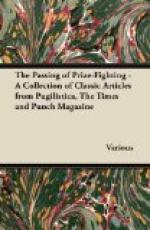I wish I could be a chameleon
And look like
a lily or rose;
I’d lie on the apples and peaches
and pears,
But not on Aunt Margaret’s yellowy
chairs—
I should have
to be careful of those.
The chameleon’s life
is confusing;
He is used to
adventure and pain;
But if ever he sat on Aunt Maggie’s
cretonne
And found what a curious colour he’d
gone,
I don’t
think he’d do it again.
A.P.H.
* * * * *
THAT TEA INTERVAL.
Before the last ball of 1920 is bowled and the last wicket in a first-class match falls (as will most probably happen at the Oval this very afternoon, September 15th), I should like to let the Gods of the Game know how I propose to spend the following winter in their interests, so that when the season of 1921 is with us the happiness of the cricket spectator may be even greater than it has been in the one now expiring.
I am going to devote the time to invention. With every grain of intellect and ingenuity that I can scrape together I am going to devise a means of humanising the tea interval.
Once upon a time I was so rash as to ridicule this interruption. I drew attention to the fact that the ancient heroes of the game had been able to dispense with it. ALFRED MYNN needed no Asiatic stimulant between lunch and the close of play. Even such whole-hearted moderns as HORNBY and SHREWSBURY and GRACE managed to do well without the support of Hyson or Bohea. For more than a century cricket and tea were strangers and cricket did not suffer. And so on. But the attacks were futile: the tea interval became an institution; and nothing now, one realises, can ever occur to separate the gallant fellows from their cups and saucers.
That being accepted, the problem is how to make the interval at once less harmful to the match and more tolerable to the lover of cricket; and it is on this problem that I have been working and intend to work through the arid football months. What has to be done is (a) to get the interval abbreviated; and (b) to keep the players on the field. It is the length of it and the empty pitch that are so depressing to the spectator, and it is the return to the pavilion that is so detrimental to the rhythm of the game. Neither of the batsmen ever wants the interruption, and I have often noticed a reluctance in certain members of the fielding side. As for the watchers, they never fail to groan.
Still, as I have said, it is now recognised that the craving for tea is as much a part of the present-day game as the six-ball over, and the time has passed for censuring it. But something can be done to regulate it; and I have based my efforts towards a solution on the argument that, if a cricketer is not called in from the game to read his telegram, but (as we have all seen so often) the telegram is taken




